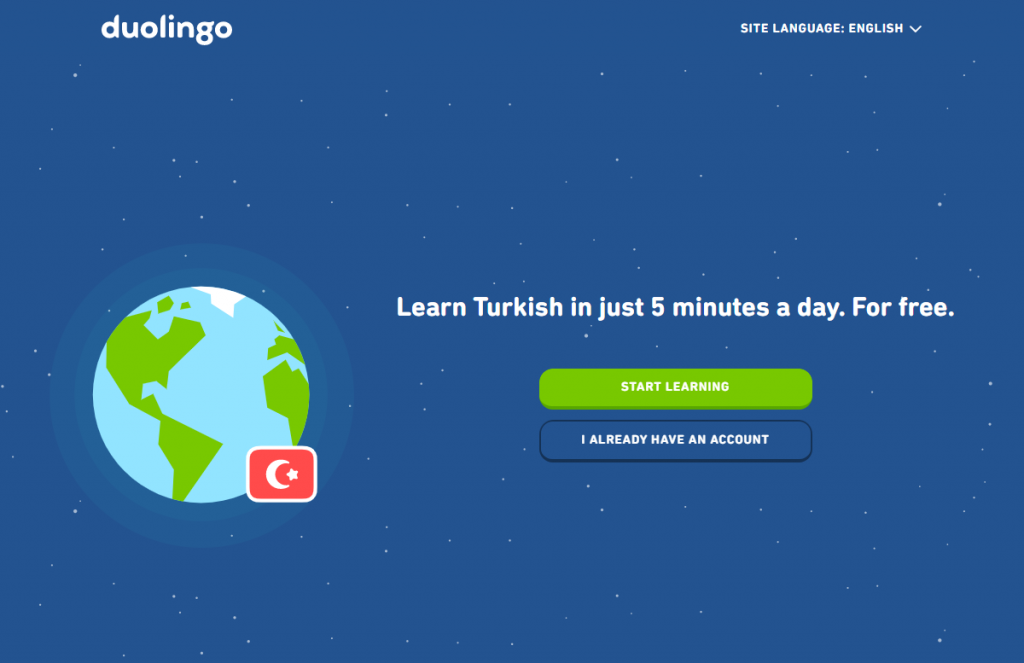It can be easy to get by in Turkey without speaking the language, especially in big cities like Istanbul and Izmir. Learning a few idioms and essential words will go a long way, but if you’re looking for work, fighting the bureaucracy, or venturing outside the tourist areas it would benefit you to learn more. Thankfully, there are no shortage of resources available for teaching yourself Turkish, most of which are free!
Getting Started
If you’re just starting or want to firm up the basics, there are a number of websites that offer to teach you Turkish, such as Duolingo (free with paid upgrades available), Busuu (paid), Mondly (free with paid upgrades available), Babbel (paid), or Yunus Emre Institute (free) to name a few. These website are a good launching point to get you immersed and introduced quickly in settings that provide immediate feedback. Many are available on mobile and have additional features to keep you engaged such as mini-games or timed competitions.

However, most of these sites limit more advanced content to paid plans or only offer a limited number of examples for each concept. To move beyond them there are tailored resources available for your learning needs.
Grammar
Grammar can often be the biggest challenge for new learners of any language, and Turkish is no exception. New students might be overwhelmed with the idea of a Subject-Object-Verb language (versus English’s Subject-Verb-Object order) and the seemingly never-ending suffixes, but at the end of the day all the grammar rules turn out to be a benefit. Like a computer language or math equation, once you’ve learned the rule you can plug a lot into it. Unlike French or Spanish, Turkish doesn’t have nearly as many exceptions, allowing you to be confident in new sentences you use even if you’ve never seen them before.
Textbooks may lack the style of most web-based learning resources, but that doesn’t mean they’re low on substance. For example, the Elementary Turkish series by Dr. Kurtuluş Öztopçu does a good job of explaining Turkish grammatical concepts in easy to understand, non-technical language. If you’d rather stick to the web though, there are no shortage of websites you can rely on for verb and grammar conjugation, a list of suffix explanations, references of similar concepts, and even user-contributed classes. Sometimes textbooks and web resources share more than grammar. In fact, the author of “The Turkish Language Explained for English Speakers: A Treatise on the Turkish Language and its Grammar” is also responsible for Manisa Turkish, a very dependable online grammar resource. The U.S. Foreign Service Institute’s Turkish grammar book (with audio exercises) can also be found online. If it’s good enough for diplomats it could help you too.
Sites like TurkishClass.com or Elon.io go a step farther by giving you instant feedback on their grammar exercises. If you’re looking to emulate a little more classroom style look to Youtube, where FC Lang Media, TurkishClass101, and Ibrahim Celiktas each have hours worth of grammar lessons. If there’s a specific concept you’re having trouble with, searching it on Youtube can often provide explanations by a few different sources.
Vocabulary
Many grammar resources will introduce vocabulary as well, but it can be helpful to focus on one at a time or a specific subject. Drops (free with paid upgrades available) associates new vocabulary with a pictures instead of a translation. Memrise (free with paid upgrades available) has as similar take and offers a number of official and community-created Turkish courses.
The Turkish language contains over 100,000 words, which can be daunting for learners. However, Turkish shares many words with other languages including Arabic, French, and Farsi. Several words describing new technologies also sound similar to English, meaning that you’re not starting from zero.
To make the most of your time, it’s important to recognize that not all words are used equally. By focusing on the top 1000 frequently used words you’re more likely to learn what you’ll need in everyday life and conversation. Memrise has a course already created, and if you’ve already mastered the first 1000 there are frequency lists available for the next 10,000 words.
Vocabulary is a memorizing game and it helps to find the format that works for you. Quizlet (free with paid upgrades available), Anki (free) allows you to make your own electronic decks and bring them with you on the web and mobile. Old-fashioned pen and paper flashcards are also an option but lack the benefits of a spaced repetition system.
Pronunciation and Comprehension
It won’t matter how much Turkish you know if you don’t have the pronunciation to communicate it, which means losing the American accent ASAP. Some resources above like TurkishClass101, Memrise, or Drops have audio components to their learning, but you should also check out Turkish Tea Time (free with upgrades available). While no longer in development, their website and archive of podcasts can help with both speaking and comprehension. For other podcasts, check out Let’s Learn Turkish, Learn Turkish with Turkish Coffee, or SBS Turkish. Tuned in Turkish (free) offers a musical take on certain grammar concepts too.
Youtube also has many, many, many videos devoted to pronunciation. Whether phrase or word based, everyone starts somewhere. If directly mimicking Turkish words is difficult, try speaking English with a Turkish accent first to learn how to make the sounds with words you know. It also helps to remember that just like at home there are a number of regional accents.

Engaging with the Language
If you’ve got all the basics down or want to move beyond studying vocabulary and grammar there are lots of opportunities to learn through Turkish-language content. Netflix (paid) has a large collection of Turkish-language movies and TV shows and even produced three of its own: The Protector, The Gift, and Rise of Empires: Ottoman. Many other films have Turkish dubs or subtitles that can be turned on as well. If you’re looking for easier content, try any children’s movie or your childhood Disney favorites. For more bite-sized content check out Youtube creators such as Barış Özcan or the what’s trending in Turkey section.
Learning doesn’t have to be limited to a screen. Try rereading your favorite books in Turkish if they’ve been translated, like the Harry Potter series has been. Walking into a bookstore can also be a way to discover something new or to assess your level. Start with a children’s book if it’s easier to read or get a comic if you prefer visuals. If you’re more advanced you can tackle newspapers, or at least try the titles to get an idea of what’s going on at the same time. Lastly, Youtube, Apple Music, and Spotify all catalogue and rank the latest and most popular music in Turkey and Şarkı Sözleri can be used to check your comprehension of the lyrics.
The Best Resource
Instead of relying on a single resource, try mixing and matching to maximize your learning opportunities. Pick one resource for everyday comprehension practice and one for grammar, then don’t forget about the others when you want to break down a specific concept! At the end of the day there is no single best resource. Choose the formats that interest and engage you enough to keep coming back. The best language learners are the ones who are motivated to keep learning and putting the time in!












Merhaba!
Have you checked out “Turkishaholic”? It has grammar and vocabulary lessons. It also has example conversations on different topics and much more educational content. Maybe you’ll like it and find it useful too!
Re music sources on YouTube, my two favorites are:
Doğa İçin Çal https://www.youtube.com/channel/UC_ljiMClHtF16_yNK8o99QA
Türkcan https://www.youtube.com/channel/UCcwbj1hsfniYdKNUJ3Q6sSg
Türkcan is actually an Azeri effort, but many songs are actually in Turkish, and Azeri is close enough to follow along. Sen Gelmez Oldun, for example.